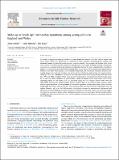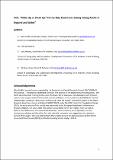Files in this item
Make up or break up? : partnership transitions among young adults in England and Wales
Item metadata
| dc.contributor.author | Pelikh, Alina | |
| dc.contributor.author | Mikolai, Julia | |
| dc.contributor.author | Kulu, Hill | |
| dc.date.accessioned | 2023-01-24T13:30:03Z | |
| dc.date.available | 2023-01-24T13:30:03Z | |
| dc.date.issued | 2022-06-01 | |
| dc.identifier | 278182319 | |
| dc.identifier | 57020b6e-fff2-47b6-b108-02488782ad3a | |
| dc.identifier | 000803749700003 | |
| dc.identifier | 85146532318 | |
| dc.identifier.citation | Pelikh , A , Mikolai , J & Kulu , H 2022 , ' Make up or break up? partnership transitions among young adults in England and Wales ' , Advances in Life Course Research , vol. 52 , 100475 . https://doi.org/10.1016/j.alcr.2022.100475 | en |
| dc.identifier.issn | 1040-2608 | |
| dc.identifier.other | ORCID: /0000-0001-8808-0719/work/111210281 | |
| dc.identifier.other | ORCID: /0000-0002-7733-6659/work/111210308 | |
| dc.identifier.uri | https://hdl.handle.net/10023/26820 | |
| dc.description | Funding: Alina Pelikh's research was supported by the Economic and Social Research Council (ES/J500094/1; PhD project: “Transition to Adulthood in Britain: The analysis of life trajectories of young adults,” the North West Doctoral Training Centre) and the University of Liverpool. Julia Mikolai's and Hill Kulu's research was supported by the Economic and Social Research Council (Grant ES/L01663X/1 ‘Partner relationships, residential relocations, and housing in the life course’ PartnerLife project in the Open Research Area Plus scheme; and Grant ES/K007394/1 under the ESRC Centre for Population Change (CPC)). | en |
| dc.description.abstract | This study investigates partnership transitions of young adults born between 1974 and 1990 in England and Wales. These cohorts were affected by the expansion of higher education, increasing gender equality, and ideational changes, but faced increased economic precarity caused by the economic and housing crisis. Given these changes, it is likely that the partnership experiences of young adults including marriage, cohabitation, separation, and repartnering have also undergone considerable changes. We apply competing risks event history analysis to combined data from the British Household Panel Survey and the UK Household Longitudinal Study to determine how birth cohort, gender, socio-economic background, and educational attainment influence partnership changes. We study the transition into and out of first cohabitation and marriage and repartnering between age 16 and 27. Cohabitation has become a universal form of first union among young adults born in the late 1970s and 1980s regardless of their socio-economic background or educational level, but their first unions do not last long. While cohabiters are equally likely to marry or separate in the oldest cohort (1974–1979), cohabiting unions are very likely to end in separation among the two youngest cohorts (1980–1984 and 1985–1990). Consequently, repartnering has become common; those in the youngest cohort repartner rather quickly suggesting that an increasing number of individuals experience multiple partnerships. Highly educated young adults have higher rates of entry into first cohabitation than their lower educated counterparts across all cohorts. However, we do not find differences in cohabitation outcomes by socio-economic background and educational level indicating that the main changes have taken place across birth cohorts. The results also suggest that there is a convergence in partnership experiences among young men and women. The increased prevalence of sliding into and out of cohabitation could indicate significant changes in the meaning young people attach to first partnerships. | |
| dc.format.extent | 18 | |
| dc.format.extent | 2648393 | |
| dc.format.extent | 1784983 | |
| dc.language.iso | eng | |
| dc.relation.ispartof | Advances in Life Course Research | en |
| dc.subject | Union formation | en |
| dc.subject | Union dissolution | en |
| dc.subject | Young adults | en |
| dc.subject | England and Wales | en |
| dc.subject | Competing risks event history analysis | en |
| dc.subject | Cohort change | en |
| dc.subject | HM Sociology | en |
| dc.subject | 3rd-DAS | en |
| dc.subject | SDG 5 - Gender Equality | en |
| dc.subject | SDG 10 - Reduced Inequalities | en |
| dc.subject | MCC | en |
| dc.subject.lcc | HM | en |
| dc.title | Make up or break up? : partnership transitions among young adults in England and Wales | en |
| dc.type | Journal article | en |
| dc.contributor.sponsor | Economic & Social Research Council | en |
| dc.contributor.sponsor | Economic & Social Research Council | en |
| dc.contributor.institution | University of St Andrews. School of Geography & Sustainable Development | en |
| dc.contributor.institution | University of St Andrews. Population and Health Research | en |
| dc.contributor.institution | University of St Andrews. Geographies of Sustainability, Society, Inequalities and Possibilities | en |
| dc.contributor.institution | University of St Andrews. Sir James Mackenzie Institute for Early Diagnosis | en |
| dc.identifier.doi | 10.1016/j.alcr.2022.100475 | |
| dc.description.status | Peer reviewed | en |
| dc.identifier.grantnumber | ES/K007394/1 | en |
| dc.identifier.grantnumber | ES/L01663X/2 | en |
This item appears in the following Collection(s)
Items in the St Andrews Research Repository are protected by copyright, with all rights reserved, unless otherwise indicated.


